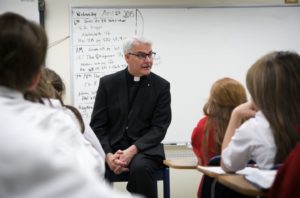Oklahoma Superintendent Ryan Walters defends nation’s first religious charter school
Oklahoma Superintendent of Public Instruction Ryan Walters penned a defense of America’s first-ever religious charter school, which is currently being sued by anti-religious groups.
The…

Oklahoma Superintendent of Public Instruction Ryan Walters penned a defense of America’s first-ever religious charter school, which is currently being sued by anti-religious groups.
The application for St. Isidore of Seville Catholic Virtual School was approved by the Oklahoma Statewide Virtual Charter School Board in June. Gov. Kevin Stitt lauded the decision as “win for religious liberty and education freedom in our great state.”
However, anti-religious groups are claiming the religious charter school is illegal.
“As the first religious public school in the nation, it could inspire copycats in other states … [and] would threaten to severely undermine public education, a cornerstone of our democracy, while infringing the religious freedom of students, families, and taxpayers,” said the American Civil Liberties Union, one of the plaintiffs in the suit.
When the lawsuit was filed in July, Walters released a press statement condemning it as “religious persecution.”
“It is time to end atheism as the state sponsored religion,” he said. “Suing and targeting the Catholic Virtual Charter School is religious persecution because of one’s faith, which is the very reason that religious freedom is constitutionally protected.”
In a column published Thursday at RealClearEducation, Walters laid out a comprehensive case in favor of the Catholic charter.
“Nothing in any of our founding documents would preclude St. Isidore’s from constitutionally operating with public funds,” he wrote. “The Supreme Court affirmed this view three years ago when it ruled against state-level provisions that prohibited religious organizations from participating in public school-choice program.”
In Espinoza v. Montana (2020), the Supreme Court ruled 5-4 that families couldn’t be denied a tax-credit scholarship simply because they wanted to use the scholarship to attend a Christian school.
Walters also references Trinity v. Comer, an earlier case with a similar conclusion – publicly available funds can’t be denied to religious groups solely because of their religious nature.
“Oklahoma’s parents should have the freedom to put their kids in a Catholic virtual charter school if they believe that that’s the best decision they can make,” Walters concluded. “I will keep fighting for them, and I will always stand up for comprehensive school choice.”
Recent studies have shown that charter students outperform traditional public schools despite receiving significantly less funding.



